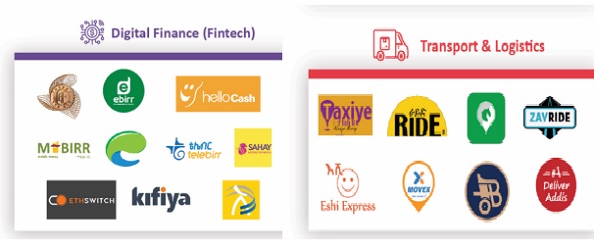
BY LAKACHEW ATINAFU
Human being has passed through situations and precarious circumstances to cope up with nature. It devises mechanisms to overcome complication it encounters. The very visionaries are always change challenges to opportunities from hunting gathering savagery social system to the era of digitization.
The innovation of updated technologies and new outlook are making life easier and easier. In this connection countries are playground of competitiveness to safely survive in the concurrent world of digitization.
Presently, the adoption of updated technologies will be the only saver for institution especially service rendering firms to stay in the competitiveness arena. Banks, immigration, tax collecting firms among others are frequently observed with long queues which left clients compliant and grievant.
Cognizant of the above fact, there are the influx of digitization to work with Ministry of Revenue and National ID ink an accord to work in collaboration envisaging Ethiopian digital identity a robust and reliable identification for all Ethiopians and Legal residents within the country to enhance efficient taxation.
The Ministry of Revenue announced on a fortnight before that it has signed an agreement to link the Tax Payer Identification Number (TIN Number) with the National Identification Number that will help prevent tax and income tax frauds and crimes.
Regarding the agreement, the State Minister of the tax operations department of the Ministry of Revenue, Meseret Meskele, said; “The agreement replaces fingerprinting to provide taxpayer identification.”
In the past, only fingerprints were used for the identification of the taxpayer, but all the fingerprints needed for the national identification were taken and an agreement was made to give to a taxpayer a secret identification number.
According to Meseret, this will reduce the amount of foreign currency that the country used to spend for this service. It is also an efficient digital system enables to control tax evasion, and economic fraud in the country.
Eyob Alemu, Technical Director for the National Id, on his part, said that the country has been incurring staggering amount of money for individuals possessed multiple identity which in turn possession of different TIN. In the course of history and fundamental changes of circumstances Ethiopians have passed through temptations for reasons it were not researched well. As time passes, some responsible citizens began to realize the naked truth and adopt best practices of the world.
Most of all the transaction cost of time was not thought of for ages; citizens were in misery to have services especially in banks custom offices, immigration, and among other service providing offices.
According to the experience of the world and taking into consideration the value of time wasted in the process of transaction, some institutes aspired to up line the countries transaction system to digitalization.
In resent discussion held in the capital the Addis Ababa, chamber of commerce told members of the press that the world is on the spring board from globalization to digitalization.
Financial technology (better known as Fintech) is used to describe new tech that seeks to improve and automate the delivery and use of financial services. At its core, fintech is utilized to help companies, business owners, and consumers better manage their financial operations, processes, and lives by utilizing specialized software and algorithms that are used on computers and, increasingly, smart phones. Fintech, the word, is a combination of “financial technology.”
When fintech emerged in the 21st century, the term was initially applied to the technology employed at the back-end systems of established financial institutions. Since then, however, there has been a shift to more consumer-oriented services and therefore, a more consumer-oriented definition. Fintech now includes different sectors and industries such as education, retail banking, fundraising and nonprofit organizations, and investment management, to name a few.
Fintech also includes the development and use of crypto currencies, such as Bit coin. While that segment of fintech may see the most headlines, the big money still lies in the traditional global banking industry and its multi-trillion-dollar.
In Ethiopia, it is not uncommon to see queues to take a taxi, pay tax and to serve for vital registration Yilikal Abate, business and technology expert and IT solution software engineer and guest speaker on the very day said that domestic institutions have to compete with the over sea business as the fittest will survive.
Ethiopia has been incurring staggering amount of money for business transaction and as a result people are lamenting over the state for complaints resulted from business as usual. The traditional routine of finance need to be rewind has to cope with the emerging world otherwise the fit will engulf unfits.
“So the finance sector; banking and other service sectors need to be digitalized and as we aspire to liberalize our economy the nation has to find a way to be more competent in the international business arena then it would be convenient Ethiopia is serving and updating itself to the world,” the expert said.
Of course, the resent development demands there are initiatives in the banking and telecom sectors. The business transaction and the banking sector which forced the citizenry to bow down for government’s policy would never work and be functional again as the world is on the light gear and emancipated from mental slavery bureaucracy and aristocracy.
The initiatives undertaken by the Ethiopian Commercial bank and Ethio-telecom might be a smart move and a good stride, according to the expert. Digitalizing the financial sector as it has been observed from the experience of many countries, it will reduce transaction cost.
Intermediaries and time will be at no cost and digitalization not demands the physical value of money man. Of course there are many challenges as the digital technology hardly addresses the amassed citizens in the agriculture construction and other sectors.
People in Ethiopia had very limited internet access. On one hand, the infrastructure is not widely organized or well-oiled; outages occur regularly. The cost of an internet package surpassing the actual income of a household is not uncommon in the country. Internet cafes, or hotspots where people can access the internet, are many Ethiopians’ best hope for a fast and reliable access. Hubs are typically located in Ethiopia’s bustling urban regions.
On the other hand, barriers to access are not just structural, but also political. The Ethiopian government’s monopoly on Ethio-telecom has made it difficult to manage access for the entire country.
The government’s strict control over telecommunications in Ethiopia not only limits the possibilities of nationwide commerce, but also disconnects Ethiopia’s economy from the rest of the world.
The goal of this new digitization strategy is to bring technology to the people of Ethiopia, as well as to its industries. Digital Ethiopia 2025 focuses on e-commerce and the ability to digitize services in traditionally non-digital industries, like agriculture and manufacturing. Utilizing modern technology to operate in these spaces will create room for investment in agriculture technology.
Digitization in the public sector, such as the implementation of a national ID database, would mean a boost in efficiency as Ethiopians all around the country connect to the internet through one streamlined system.
The other big push that Digital Ethiopia 2025 is championing is the privatization of the telecommunications sector. The government’s explicit control over media and news, internet traffic, and trade via telecommunication not only pose threats to privacy but also limits competition. The original plans to sell a large stake of government-held Ethio-telecom ended up on hold in May 2020, largely due to economic shifts as a result of COVID-19. However, moving forward with plans will likely be the key to advancing the market capacity of Ethiopia’s telecommunications sector and the economy as a whole.
Digital Ethiopia 2025 is Ethiopia’s first major step towards a more connected and efficient economy, as well as towards more protections for Ethiopians and their access to information. These efforts are critical to modernizing the economy and creating a self-sustaining digital sector.
The Ethiopian Herald December 14/2022





